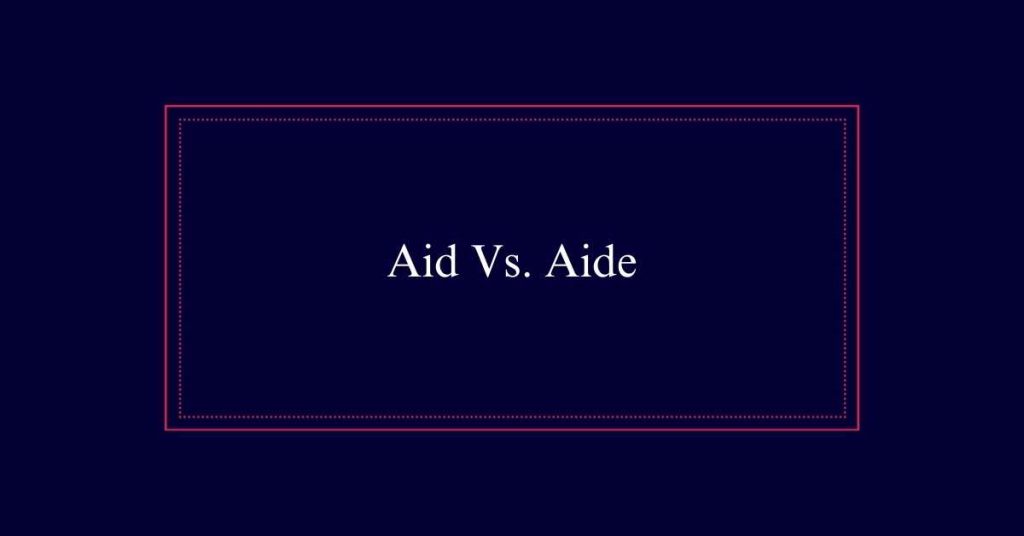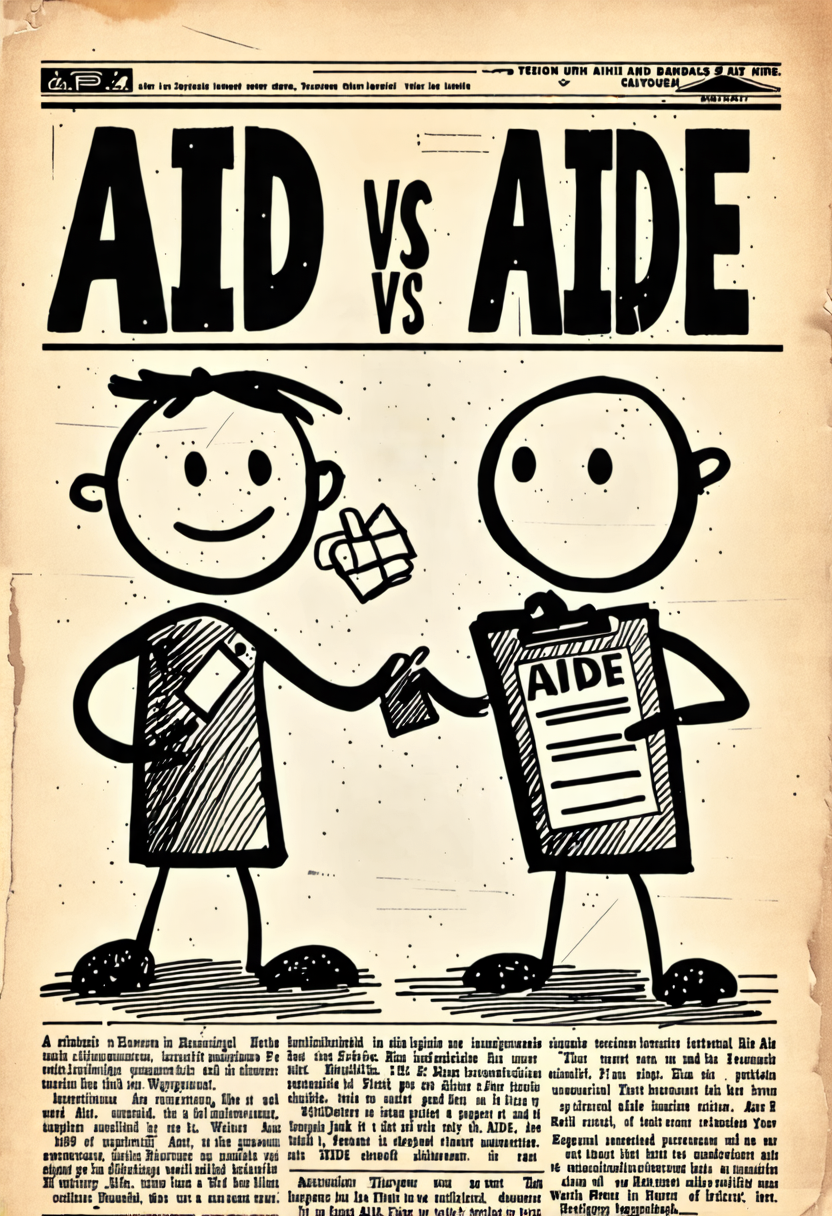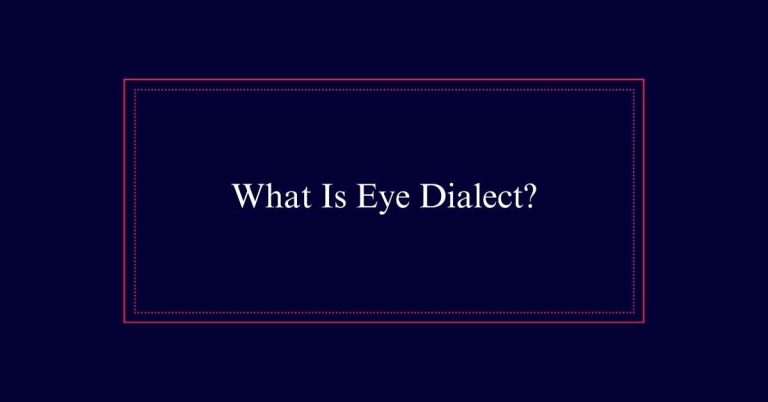Aid Vs. Aide
The terms ‘aid’ and ‘aide’ are often confused but have distinct meanings. ‘Aid’ can be a verb meaning to help, such as ‘to aid someone,’ or a noun referring to assistance provided, like ‘financial aid.’ It encompasses various forms of support, including medical, legal, and emergency help. Conversely, ‘aide’ is always a noun and refers to a person who provides assistance, such as a nurse’s aide or an aide in a government office.
Definitions of Aid
Aid is a versatile term that functions as a verb, noun, and adjective, generally meaning help or assistance. As a verb, it means to help or assist. For example, ‘He stayed home to aid his aging parents.’
As a noun, it refers to help or assistance provided. An example is, ‘The first round of financial aid was granted to the developing country.’
The term can also be used in an adjective form, such as in ‘aid package,’ describing something that provides assistance.
Definitions of Aide
An aide is a person who provides assistance or support, often in a professional or official capacity. They play pivotal roles in various settings, such as healthcare, government, and education. Aides help guarantee smooth operations and often handle tasks that require confidentiality and discretion.
| Setting | Role of Aide | Examples |
|---|---|---|
| Healthcare | Assist medical staff | Nursing aide, medical assistant |
| Government | Support officials | Legislative aide, executive aide |
| Education | Aid teachers and students | Teacher’s aide, classroom aide |
Aid as a Verb
To aid someone means to provide help or support in achieving a goal or completing a task. When used as a verb, ‘aid’ implies offering assistance, whether through physical help, financial support, or advice.
For example, a teacher might aid a student in understanding a complex topic. Similarly, an organization may aid a community by providing resources during a crisis. The verb ‘aid’ emphasizes the act of making a positive contribution toward someone’s effort or situation.
It is synonymous with words like ‘help’ and ‘assist,’ and is often used in contexts where collaboration or support is necessary to overcome challenges or accomplish objectives.

Aid as a Noun
While the verb ‘aid’ focuses on the act of helping, as a noun, it refers to the assistance or support provided. Aid can encompass various forms of help, such as financial, medical, or educational support.
Financial aid often includes grants, loans, and scholarships, which enable individuals or organizations to meet their financial needs. Medical aid refers to the provision of healthcare services and supplies to those in need. Educational aid includes resources like textbooks, technology, and tutoring services to enhance learning.
Examples of Aid
Numerous instances of aid illustrate its importance in various sectors. Financial aid helps students afford higher education and supports developing countries during crises. Legal aid guarantees access to justice for those who cannot afford legal services. Emergency aid provides immediate relief during natural disasters or crises. Medical aid delivers essential healthcare services to underserved populations.
| Type of Aid | Description | Example |
|---|---|---|
| Financial Aid | Monetary assistance for education and crises | Scholarships for students |
| Legal Aid | Legal services for those unable to afford them | Representation in discrimination cases |
| Emergency Aid | Immediate relief during disasters | Food and shelter after hurricanes |
| Medical Aid | Healthcare services for underserved communities | Mobile clinics in rural areas |
Examples of Aide
Moving from the various forms of aid, we now focus on examples of aide in different contexts.
In professional settings, an aide often refers to a personal assistant or support staff member. For instance, Nick Hewer served as Lord Sugar’s aide on the television show ‘The Apprentice.’
In government, aides are essential; they assist officials with various tasks, such as research and scheduling.
Medical aides, like nurse aides, provide vital support in healthcare settings by assisting patients with daily activities.
School aides help teachers manage classrooms and support student learning.
Legal Aid Explained
Legal aid is a crucial service that guarantees access to justice for individuals who cannot afford legal representation. It secures that all citizens, regardless of financial status, have the opportunity to defend their rights and interests.
Legal aid often covers various areas of law, including but not limited to:
- Criminal defense: Ensuring fair trials for those accused of crimes.
- Family law: Assisting with divorce, custody, and domestic violence cases.
- Housing issues: Addressing evictions and unsafe living conditions.
- Employment disputes: Protecting workers’ rights and resolving wage conflicts.
- Discrimination cases: Fighting against unfair treatment based on race, gender, or other factors.
Financial Aid Overview
While legal aid guarantees access to justice, financial aid offers important monetary support to individuals and organizations in need.
Financial aid can take various forms, including grants, scholarships, and loans. These funds are essential for helping students afford higher education, thereby opening doors to better career opportunities.
Additionally, financial aid is crucial for developing countries, especially during crises such as natural disasters or economic downturns. Organizations and governments often provide this aid to promote stability and growth.
Wasteful Aid Spending
Wasteful aid spending undermines the effectiveness of financial assistance programs and hampers development efforts. When funds are not used efficiently, the intended benefits fail to reach those in need. This mismanagement can occur due to various reasons:
- Corruption: Funds are siphoned off by corrupt officials.
- Administrative Costs: Excessive bureaucracy eats into the aid budget.
- Misallocation: Aid is directed towards less needy areas.
- Lack of Oversight: Insufficient monitoring leads to misuse.
- Poor Planning: Projects are poorly designed and fail to deliver results.
Aide in Popular Culture
Aides in popular culture often play pivotal roles in narratives, reflecting their significant contributions in real-life scenarios. From television series to movies, aides are depicted as essential figures who support and advise main characters. These representations underscore the importance of aides in various settings, including political, medical, and corporate environments.
Below is a table showcasing examples of aides in popular culture:
| Medium | Example Character | Role | Show/Movie |
|---|---|---|---|
| Television | Donna Moss | Political Aide | The West Wing |
| Television | Jonathan Pine | Hotel Night Manager | The Night Manager |
| Film | Alfred Pennyworth | Butler/Advisor | Batman Series |
| Literature | Dr. Watson | Assistant/Companion | Sherlock Holmes |







